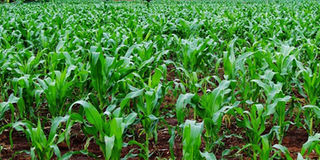Allocate 10pc of Government budget to agriculture

What you need to know:
- Sadly, although Tanzania ought to have been seeing it coming, it has relied on rain-fed agriculture.
- So, when the Tanzania Meteorological Authority (TMA) warned that half of the major cereal-producing regions received rain below average last month, it was not something entirely unexpected.
Reports about climate change have been sounding alarm bells to communities to sometimes apocalyptic levels.
Sadly, although Tanzania ought to have been seeing it coming, it has relied on rain-fed agriculture.
So, when the Tanzania Meteorological Authority (TMA) warned that half of the major cereal-producing regions received rain below average last month, it was not something entirely unexpected.
TMA report named Dar es Salaam, Tanga, Coast, Morogoro, Kilimanjaro, Arusha, Manyara, Kigoma, Katavi, Tabora, Dodoma and Singida as the regions that would receive rain below average, with Kagera, Geita, Shinyanga, Mwanza, Mara and Simiyu being among those that will receive average rainfall.
A Famine Early Warning Systems Network report projected that seasonal rainfall deficits, coupled with erratic rain, would reduce cereal yields.
The delayed onset and below-average short rain (mid-September to December) pointed to a likely deterioration in food security in Arusha, Kilimanjaro, Coast and Tanga regions as the harvest in March is expected to be significantly lower than normal. It has warned that reduced labour opportunities, coupled with rising food prices, are likely to constrain purchasing capacities and food access.
Poor households in Geita, Kagera, Kigoma, Mwanza and Shinyanga face acute food insecurity, following a slow and below-average start to the long rainy season. Reduced agricultural labour opportunities have limited household income, and many poor households are unable to re-plant as a result. Below-average production from the harvest in March/April 2017 is anticipated and will erode household capacities to access food.
While on a recent tour of Simiyu Region, President John Magufuli aptly urged farmers to plant-drought resistant crops. But many farmers complain about lack of modern farming techniques, right seed varieties and other inputs. In Magu District, farmers have appealed to the government to dispatch more extension officers.
Many extension officers have retired
However, reports say many extension officers have retired. This means it will be difficult for farmers to get modern farming techniques. It will need time to muster resources to train and hire them. But climate change is escalating -- so fast.
Magu authorities say the whole district has 30 extension officers, too few to serve farmers adequately in more than 10 wards.
This is the tip of the iceberg. Agriculture is neglected to say the least. A new report has shown that the number of people engaged in farming decreased to 67 per cent in 2014 from over 85 per cent in 2002. Although employing 67 per cent of the workforce, agriculture accounts for only 24.5 per cent of the national wealth.
Repoa notes in one of its publications that the proportion of the labour force dependent on agriculture fell from 75 per cent in 2002 to 67 per cent in 2014. Previously, the number of people engaged in farming was well over 80 per cent.
It’s high time we implemented the African Union’s Malabo and Maputo Declarations on Food Security and Agriculture by allocating 10 per cent of the national budget to the sector to improve production and feed factories to realise our industrialisation dream. With 61,500 square kilometres of its territory of 947,300 square kilometres covered by water, depending on rain-fed agriculture is morally wrong.




